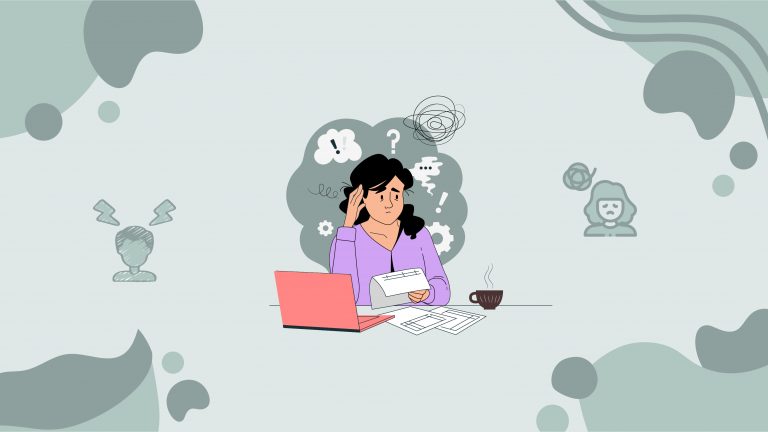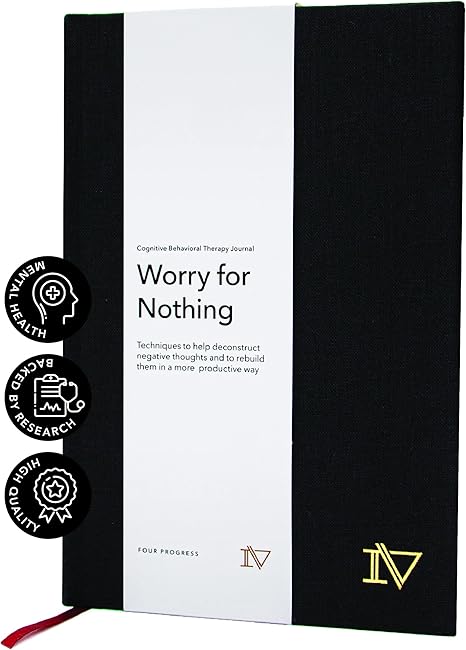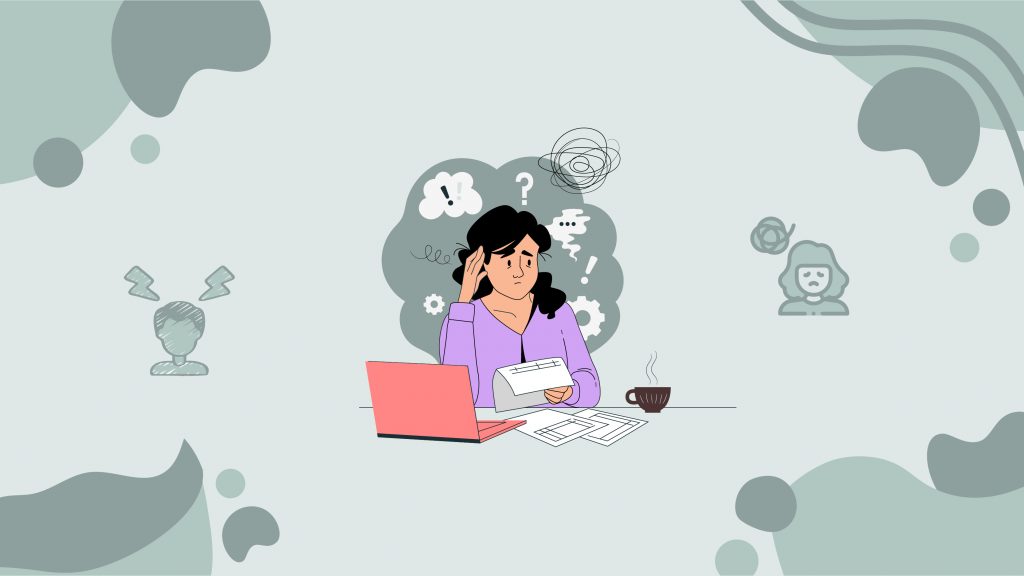“Mind full of thoughts, only looking for answers; a burden too heavy, sinking deep into shoulders!”
You are sitting alone in your room, with unstoppable random thoughts racing through your mind. You have no idea when these thoughts turn into panic, and now your heartbeat is rapid, and suddenly, you are struggling to breathe.
Have you ever been in this situation?
Have you ever felt that when you cannot think straight or move your body because your mind is playing tricks on you? You’re trying hard to get out of the situation, but it’s not working, and eventually, you are sinking deep into it, and now you are suffering from anxiety.
This is a very common situation that most people face. Most of them are unaware of what is happening to them and fail to find a coping mechanism.
Here, we will discuss the stressors in detail to make you aware and take early precautions to manage your stress and anxiety.
Identify the Stressors in Your Life
Imagine you suddenly wake up with the buzzing of your alarm and realize you overslept. You start rushing through your morning routines and skipping important things like your breakfast, and now you are left in a hurry with a panicked mind and feeling anxious.
Your day starts with an everyday stressor, filling your entire day with unwanted anxiousness. You cannot focus on your work, and your attention remains divided throughout the day, worsening the situation. And you come home with the same feeling, making it hard to sleep at night, and the cycle repeats.
All of these external events and conditions are stressors that make you irritable, impatient, and overwhelmed. Stressors trigger your body’s stress response, leading to physical, emotional, and mental strain.
One person might feel one thing stressful while another does not, as stressors can vary among individuals. Understanding the stressors is necessary to manage stress effectively.
What Situations Become Stressors?
Situations that push us out of our comfort zone and test our ability to cope become stressors. Anything that causes a change in your daily routine, an unexpected event, or anything that makes you feel uncertain or threatened is a stressor.
For example, a work deadline can make you feel overwhelmed and stressed. Financial difficulties can add to your stress, and relationship issues and health problems are significant sources of stress.
Common Stressors in Our Lives
Multiple stressors in our lives affect us mentally and physically, leading to an unhealthy and poor lifestyle. Here are some of the common causes of stress that we face regularly:
#1: Financial Stressors
If you constantly worry about money and financial challenges and cannot sleep at night and focus on work during the day due to unpaid bills or a lack of funds, then you are stressed.
1 in 5 people report that their financial issue is the primary source of stress. Here are some of the common financial stressors we face:
- Unpaid bills: You have unpaid bills piling up on the table. Every time you come home and see those piles, you become stressed, and it starts affecting your eating cycle and peaceful sleep. You become more stressed as the days pass. You can set reminders, keep track of due dates, and manage your bills to overcome this situation.
- Unplanned expenses: You are in a situation where you have already spent your salary, and out of nowhere, an unexpected expense suddenly appears. You need more money due to your unplanned or unmanaged expenses and start panicking. If you want to avoid unplanned expenses, you can keep some emergency money aside every time you get your salary and use that money when needed.
- Increase in financial obligations: We live in a materialistic world where financial obligations only increase while income remains the same. These obligations could be your living costs, education fees, or unexpected responsibilities, which only cause stress. To overcome these kinds of financial issues, you can look for multiple sources of income or seek financial advice for better results.
#2: Physical Stressors
The level of stress we face in our daily lives affects our physical health. If you have too many stressors in your life, your behavior will change constantly, your mental and physical health will be affected, and your lifestyle will completely change.
Around 40% of adults report that poor sleep quality intensifies their stress levels, making them more anxious and unable to manage daily tasks. You can relate to these physical stressors you might face in your daily life:
- Illness: If you have health issues, especially chronic or severe illness, it could become the major source of stress in your life. To avoid these health issues, you can opt for regular check-ups and a healthy lifestyle to manage the illness effectively.
- Not enough sleep: You scroll through your phone and spend too much time on social media instead of going to sleep, which causes you social anxiety. Improper sleep leads to unwanted stress. To overcome these issues, you must limit or avoid screen time before going to sleep and set a consistent sleep-wake time.
- Poor diet: If you are a workaholic and do not have enough time for a healthy or balanced diet, a poor diet leads to health issues and stress. To reduce stress caused by a poor diet, you can plan balanced meals that include a lot of fruits and vegetables to boost your energy level.
- Drug consumption/Too much alcohol/Too much caffeine: Someone who consumes too much drugs, alcohol, or caffeine leads to dependency and disrupts neurotransmitter balance, resulting in high levels of anxiety. For better mental and physical health, you can limit the intake of these substances and change your lifestyle by seeking healthier alternatives and doing physical activities to boost your health.
#3: Social Stressors
We are social animals, and adjusting to social norms can be stressful and harmful to our mental and physical wellness.
Studies show that individuals with strong social support networks are 50% more likely to have lower stress levels and better mental health than those with limited social interactions. Here are some of the everyday social stressors affecting your daily life:
- Conflict with others: Imagine you are at your workplace and have a conflict with your colleague. This conflict affects your mental peace, and you cannot focus on your work and complete the task within the deadline, leading to a state of stress and anxiety. You can resolve this situation with open communication and active listening, which helps to reduce the cortisol level and make you less stressed.
- Not spending enough time with important people: When you are giving more time to your work life and ignoring your personal life and the people around you, it builds up the feeling of guilt as you are not able to spend enough time with your family and friends, which can cause you stress and anxiety. You can overcome the situation by scheduling regular time with your loved ones and increasing oxytocin to boost your emotional well-being.
- Personal Relationships: If you are having an unhealthy relationship with your family, friends, or colleagues, you are more likely to have stress and anxiety issues. You can maintain a healthy relationship with mutual respect and empathy to support your mental health.
- Lack of social support: You do not interact with people much and have a very limited social network, making it difficult to get social support and hard to cope with stress. You can join community groups or clubs to expand your social network and find a supportive friendship.
- Loneliness: Loneliness is another factor behind a stressful life. You are alone, and thoughts never stop running through your mind, resulting in panic attacks and anxiety. In these scenarios, you can reach out to a friend or make yourself busy with social or outdoor activities to avoid all the negative thoughts.
#4: Occupational Stressors
Having occupational stress is like having a constant headache, which no pills have effects on.
Nearly 50% of employees cite heavy workloads and tight deadlines as significant stressors in their professional lives. Here are some of the common occupational stressors that are affecting your lifestyle:
- Being unhappy in your job: Doing a job that you are not happy with only to meet your end needs can cause mental stress, which can affect your mental and physical health. You can avoid this kind of stress by identifying the aspect of your job so that you can better focus and enjoy it. Another way is to discuss the matter with your supervisor or seek new opportunities that align with your passion.
- Having a heavy workload and deadlines: When you are working in your office and realize that you are approaching your deadline and do not have enough time to complete your task, it makes you feel uneasy and anxious. To overcome this situation, you can prioritize your tasks and manage your breaks to reduce workload stress and improve efficiency.
- Working long hours: working for long hours does not leave you with enough time for yourself and your family, eventually leading to a stressful life. You can avoid burnout by clearly setting boundaries and managing your breaks to maintain a work-life balance.
- Unrealistic expectations at work: When you are pressured to meet unrealistic expectations at work, you will experience unnecessary stress, which will affect your thinking ability and make you unable to concentrate. To improve the situation, you need to openly communicate with your employer about achievable goals and seek support if necessary.
- Job insecurity: Job insecurity is a common cause of stress among most people, causing fear of losing their jobs and instability. To overcome the stress caused by job insecurity, you can always enhance your skills through continuous learning and networking and stabilize serotonin levels to reduce stress.
#5: Life Events Stressors
Several life events affect your emotional and mental well-being and increase your stress level.
Research indicates that 20–25% of individuals who experience traumatic events such as natural disasters or violence suffer from long-term stress. Let’s have a look at these kinds of events below:
- Death of a loved one: One of the most painful and stressful events for anyone who faces it. You are in grievance and unable to cope with the situation, resulting in a higher level of stress and depression. To overcome this situation, you must allow yourself time to grieve and seek support from friends, family, or counselors if required for your emotional balance.
- Losing a job: Another event that causes stress is losing a job. It demotivates you and affects your confidence level. If you do not want to lose your calm in this situation, you can start working on yourself, your resume, and your skills, or consider seeking a new career path for financial stability.
- Marriage: Marriage is an important event that significantly affects our lives. It involves adjustments and changes in our daily routines, which can be stressful for a person. To cope with the situation, you can build a strong foundation of trust by communicating openly and having mutual respect.
- Divorce: A divorce is an event that affects both people emotionally and financially, causing stress in their lives. To overcome this, you can focus on self-care or seek counseling to rebuild your life.
- Traumatic events: You might have suffered or witnessed something traumatic that you cannot forget even after a long time. The event haunts you and gives you a stressful life. You can manage this kind of stress by seeking professional help and using stress-reducing techniques like mindfulness meditation and physical activities.
How You Can Deal With Stressors?
You can beat the stressors and manage your stress level better with the strategies given below:
- To deal with stress and its effects, you must first identify the stressors. You can keep a journal to track the stressors, learn how to respond to them and identify patterns and triggers.
- To cope with stress-causing elements, you can engage in activities such as exercise, hobbies, and mindful practices to reduce stress and anxiety.
- You must maintain a healthy lifestyle, ensure that you get enough sleep, eat your food timely, have a balanced diet, and avoid consuming things that can become stressors, such as drugs, alcohol, or caffeine.
- Having a strong support system and healthy relationships with friends and family can help you manage stress and avoid uneasy thoughts.
- Another effective method of dealing with stress is to seek professional help. Talking to a therapist or a counselor can help you understand the stressors and how to manage them.
- Time management plays an important role in managing stress and anxiety. It involves prioritizing tasks and setting realistic goals.
- Regular breaks can help you reduce stress and recharge your mental and physical energy to work on your goals and achieve them.
It becomes important to understand the stressors and prepare effective strategies to reduce them in order to maintain your mental and physical balance and improve overall well-being.
“Understanding life, making changes for the better! Focusing on self-care, and the things that matters!”
Sources
- The University of New Orleans: Managing Your Stress
- The University of Virgin Islands: Address your stress for a Healthier Life Today
- Kansas State University: Managing the Strain of Stress
- Yale School of Medicine: The Science of Stress, Bad Habits, and Risk of Chronic Disease
- University of Berkeley: What Are The Signs and Symptoms of Stress?





















